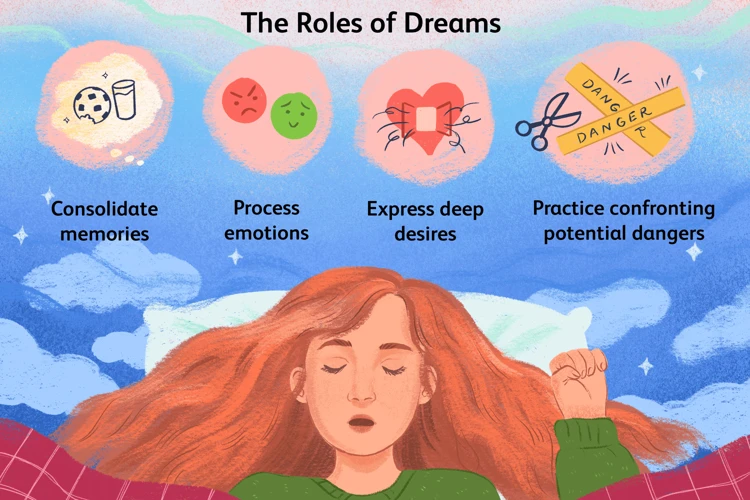Have you ever woken up in the middle of the night, covered in sweat, heart racing, and feeling an overwhelming sense of fear from a nightmare? Nightmares, those terrifying and vivid dreams, have long intrigued and perplexed us. They hold a significance that goes beyond mere random images and emotions. In this article, we will delve deep into the meaning behind nightmares and their impact on dream patterns. We will explore the role of nightmares in the dreaming process, common themes and symbols found in nightmares, as well as the psychological interpretation of these haunting dreams. Additionally, we will discuss the impact that nightmares can have on our sleep patterns and overall well-being. Whether you are looking to understand and analyze your own nightmares or seeking methods to overcome them, this article aims to provide you with valuable insights and practical solutions. So, fasten your seatbelt and prepare to unlock the intriguing world of nightmares.
The Meaning Behind Nightmares

Nightmares have a deep and profound meaning that often eludes us. They are not merely random images and emotions concocted by our minds during sleep. Instead, they possess a hidden language that we must decipher to understand ourselves better. The role of nightmares in the dreaming process is multifaceted and complex, serving as a doorway to our subconscious minds. They allow us to confront unresolved fears, anxieties, and traumas that we may be consciously unaware of. Nightmares often contain common themes and symbols that can provide valuable insights into our innermost thoughts and feelings. By exploring the psychological interpretation of nightmares, we can uncover the underlying meanings and messages they hold. Understanding the significance of nightmares is crucial in unraveling the exciting world of dream patterns and their connection to our emotional well-being.
The Role of Nightmares in the Dreaming Process
The role of nightmares in the dreaming process is both intriguing and mysterious. Nightmares serve as a powerful mechanism through which our subconscious mind communicates with us. While pleasant dreams can bring joy and inspiration, nightmares delve into the depths of our fears and anxieties. They act as a psychological alarm system, alerting us to unresolved issues and emotions that we may be suppressing in our waking lives. In a way, nightmares force us to confront our deepest fears and traumas, allowing us to process and heal from them. By diving into the symbolism and imagery present in nightmares, we can gain valuable insights into our own psyche and emotional state. Nightmares often present common themes and symbols, such as falling, being chased, or feeling trapped, which can provide clues about the underlying meanings and messages within the dream. Understanding the role of nightmares in the dreaming process is a key component in exploring and deciphering the different types of dream patterns that occur during sleep, ultimately leading to a greater understanding of ourselves and our inner world.
Common Themes and Symbols in Nightmares
Nightmares often feature a variety of common themes and symbols that recur across different individuals. These symbols act as a form of communication between our conscious and subconscious minds, offering insights into our deepest fears, desires, and concerns. One common theme in nightmares is being chased, which represents an overwhelming sense of fear and powerlessness. Falling is another prevalent symbol, often indicating a lack of control or a fear of failure in waking life. Many nightmares revolve around being trapped or unable to escape, reflecting feelings of being stuck or trapped in a particular situation. Teeth falling out is a symbol that frequently appears in nightmares and is thought to be related to feelings of insecurity, vulnerability, or a fear of aging. Another common theme is experiencing physical harm or injury, which may reflect feelings of vulnerability or a need for self-protection. Snakes or spiders often symbolize hidden fears or anxieties, while being naked in public can represent feelings of vulnerability or embarrassment. These examples highlight just a few of the common themes and symbols present in nightmares. By analyzing and understanding these symbols, we can gain valuable insights into our subconscious thoughts and emotions, ultimately aiding in our self-growth and development.
Psychological Interpretation of Nightmares
The psychological interpretation of nightmares offers valuable insights into the underlying meanings behind these haunting dreams. It is believed that nightmares serve as a reflection of our deepest fears, anxieties, and unresolved emotional conflicts. By analyzing the symbols, themes, and emotions present in nightmares, psychologists can uncover hidden aspects of our subconscious mind. For example, recurring nightmares about being chased may indicate a feeling of being pursued by unresolved issues or past traumas. Nightmares that involve losing control or being trapped can signify a sense of powerlessness or being trapped in a certain area of life. The emotional intensity experienced during nightmares can also provide clues about underlying emotional stress or trauma that may need attention. By exploring the psychological interpretations of nightmares, individuals can gain a deeper understanding of their own thoughts, emotions, and experiences. This understanding can be an important step in personal growth, healing, and overcoming the impact of nightmares on overall well-being.
The Impact on Dream Patterns

Nightmares not only hold symbolic meaning, but they also significantly impact our overall dream patterns. When we experience disturbing nightmares, our sleep is often disturbed and characterized by restless tossing and turning. This disrupted sleep can lead to emotional stress and a feeling of unease upon waking. Recurrent nightmares can even contribute to the development of sleep disorders, such as insomnia or sleep apnea. Understanding the impact of nightmares on dream patterns is essential in finding ways to overcome their negative effects. One intriguing approach to transforming nightmares and dream patterns is inducing lucid dreams. Lucid dreaming allows individuals to become aware that they are dreaming, providing an opportunity to actively influence and reshape the dream experience. By exploring techniques to induce lucid dreaming, we can empower ourselves to make positive changes in our dream patterns and overall well-being.
Disturbed Sleep and Emotional Stress
Disturbed sleep caused by nightmares can have a profound impact on our emotional well-being, leading to increased levels of stress and anxiety. When we experience vivid and disturbing nightmares, our sleep becomes fragmented, preventing us from entering into the restorative stages of sleep. This can result in fatigue, difficulty concentrating, and impaired cognitive functioning throughout the day. The emotional toll of recurring nightmares can be significant, causing heightened levels of fear, sadness, and even depression. The content of nightmares often reflects our deepest fears and unresolved emotional issues, which can further exacerbate our emotional distress. The cycle of disturbed sleep and emotional stress can create a vicious loop, as heightened levels of stress can increase the likelihood of experiencing more nightmares. It is crucial to address and manage both the disturbed sleep and the emotional stress that accompanies nightmares to restore a sense of well-being and promote healthier sleep patterns.
Recurrent Nightmares and Sleep Disorders
Recurrent nightmares can be a distressing and disruptive occurrence, impacting both our quality of sleep and overall well-being. When nightmares become a regular part of our sleep patterns, they may indicate the presence of sleep disorders. Conditions such as post-traumatic stress disorder (PTSD) and nightmare disorder can lead to frequent nightmares that recur over extended periods. These nocturnal disturbances can significantly affect our sleep quality, leaving us feeling exhausted and mentally drained during the day. The fear and anxiety experienced during recurrent nightmares can also contribute to the development of other sleep disorders, such as insomnia and sleep anxiety. Seeking professional help from a sleep specialist or a mental health professional is crucial if recurrent nightmares are causing significant distress and disrupting our daily functioning. Treatment options may include cognitive-behavioral therapy and exposure therapy to address the underlying causes of the nightmares and promote restful sleep. It is essential to remember that recurrent nightmares and sleep disorders are not something to ignore or dismiss, as they can have a profound impact on our overall well-being and quality of life.
Inducing Lucid Dreams for Transformation
Inducing lucid dreams for transformation is a fascinating technique that allows individuals to become aware that they are dreaming while in the midst of a dream. This heightened state of consciousness provides a unique opportunity for personal growth and self-discovery. Lucid dreaming allows individuals to actively participate and manipulate the dream scenarios, leading to profound transformations in their waking lives. By recognizing that they are in a dream state, individuals can take control of the dream narrative, explore their fears and desires, and even practice new skills or behaviors. This transformative process offers an array of benefits, including overcoming recurring nightmares, enhancing creativity, and gaining insight into one’s subconscious mind. Techniques such as reality checks, dream journaling, and meditation can be employed to increase the likelihood of inducing lucid dreams. Additionally, certain herbs and supplements, like galantamine and valerian root, have been known to promote lucid dreaming. It is important to approach lucid dreaming with a sense of curiosity and respect, as it can be a powerful tool for personal growth and self-exploration. So, if you’re ready to embark on a journey of transformation, unlocking the potential of lucid dreaming may be just the key you need.
Understanding and Analyzing Nightmares

Understanding and analyzing nightmares is essential for gaining insight into our subconscious minds and unraveling the hidden meanings behind these unsettling dreams. Keeping a dream journal can be a valuable tool in this process, as it allows us to record and reflect upon our dreams, including nightmares. By documenting the details of our dreams, such as the imagery, emotions, and any recurring themes or symbols, we can start to discern patterns and connections that may provide clues to their significance. In some cases, seeking professional help from therapists or dream analysts can provide invaluable guidance in interpreting and understanding the complexities of our nightmares. These experts have specialized knowledge and tools to delve deeper into the messages hidden within our dreams. Another powerful method is dream analysis, where we explore the symbolic meanings behind the elements present in our nightmares. This involves examining the relationship between the dream images and our waking life experiences and emotions. Through these methods, we can unlock the profound wisdom that lies within our nightmares and gain a deeper understanding of ourselves.
Keeping a Dream Journal
Keeping a dream journal is an invaluable tool for unraveling the mysteries of our nightmares and dream patterns. When we wake up from a nightmare, our first instinct may be to forget it and move on. However, by making a conscious effort to record our dreams, we can gain deeper insights into their meaning and impact on our lives. A dream journal serves as a repository of our dreams, allowing us to revisit and analyze them later for patterns, themes, and symbolism. It is important to write everything down in detail as soon as we wake up, capturing the emotions, visuals, and any other sensory experiences while they are fresh in our minds. This process helps to solidify the memories of our dreams and enables us to identify recurring patterns or symbols that may be significant. Additionally, doodling or sketching certain elements of our dreams can provide a visual representation that enhances our understanding. Over time, reviewing our dream journal can reveal patterns and connections that might not have been apparent initially, shedding light on our subconscious thoughts and feelings. Keeping a dream journal is a powerful tool in unraveling the meaning behind nightmares and unlocking the fascinating realm of our dreams.
Seeking Professional Help
When nightmares become frequent, intense, or have a significant impact on your daily life, it may be beneficial to consider seeking professional help. A mental health professional, such as a therapist or psychologist, can provide valuable guidance and support in understanding and managing your nightmares. They have the expertise to delve deeper into the underlying causes of your nightmares and help you develop effective coping strategies. Through therapy sessions, you can explore any past traumas or unresolved issues that may be contributing to your nightmares. Therapists may use various techniques, such as cognitive-behavioral therapy (CBT), exposure therapy, or eye movement desensitization and reprocessing (EMDR), to address the underlying emotional distress associated with nightmares. Additionally, they can assist you in overcoming sleep-related disorders that might be exacerbating the frequency or intensity of your nightmares. Seeking professional help offers a safe and supportive environment to express your fears and anxieties, receive validation, and work towards resolving the underlying issues contributing to your nightmares. Remember, you don’t have to face your nightmares alone; qualified professionals are there to guide you on your journey towards better sleep and emotional well-being.
The Power of Dream Analysis
Dream analysis holds immense power in unlocking the secrets of our unconscious mind and providing profound insights into our thoughts, emotions, and experiences. Engaging in the power of dream analysis allows us to delve deeper into the symbolism and meaning behind our dreams, including nightmares. Through careful examination and interpretation of dream elements such as characters, objects, and actions, we can gain a profound understanding of our own psyche. Dream analysis enables us to recognize patterns and recurring themes in our dreams, which can offer valuable guidance in various aspects of our lives. By keeping a dream journal and documenting our dreams regularly, we can start to identify recurring symbols and themes, thus enabling us to develop a stronger connection with our dreams and subconscious mind. Seeking professional help from a therapist or dream analyst can further enhance the power of dream analysis. These experts possess the knowledge and experience to guide us through the intricate layers of our dreams, helping us uncover hidden meanings and facilitating personal growth and self-awareness. The power of dream analysis lies in its ability to tap into our inner wisdom and provide us with unique insights, leading to personal transformation and a deeper understanding of ourselves and our dreams.
Methods to Overcome Nightmares
When it comes to overcoming nightmares, there are several effective methods that can help bring peace and tranquility to your nights. Creating a relaxing sleep environment is essential, as it sets the stage for restful slumber. This can be achieved by dimming the lights, playing soothing music, and utilizing calming scents such as lavender. Stress reduction techniques are also beneficial in combatting nightmares. These techniques include practicing mindfulness, engaging in relaxation exercises like deep breathing and progressive muscle relaxation, and incorporating stress-management activities into your daily routine. Another method that has shown great promise is Nightmare Reprocessing Therapy, which involves revisiting the nightmare in a safe and controlled environment to process and reframe the traumatic elements. By implementing these methods to overcome nightmares, you can reclaim peaceful nights and restore balance to your sleep patterns, promoting overall well-being.
Creating a Relaxing Sleep Environment
Creating a relaxing sleep environment is essential for ensuring a peaceful and restorative night’s sleep. To cultivate such an environment, several key factors must be taken into consideration. Firstly, optimize the lighting in your bedroom. Use soft, dim lights or blackout curtains to block out any external sources of light that may disrupt your sleep. Additionally, maintain a comfortable temperature in your bedroom. Ensure the room is neither too hot nor too cold, as extreme temperatures can interfere with sleep quality. Investing in a high-quality mattress and pillows that provide adequate support can also greatly enhance your sleeping experience. Furthermore, minimize external noise that may disturb your sleep by using earplugs, a white noise machine, or soothing nature sounds. Declutter your sleep environment by organizing and tidying up the space, as a cluttered room can negatively impact your ability to relax and unwind. Finally, establish a bedtime routine that includes calming activities such as reading, taking a warm bath, or practicing relaxation techniques like deep breathing or meditation. By implementing these strategies, you can create an environment conducive to relaxation and promote better sleep quality, ultimately reducing the chances of experiencing disturbing nightmares.
Stress Reduction Techniques
Managing stress is crucial in overcoming nightmares and improving overall sleep quality. By incorporating effective stress reduction techniques into your daily routine, you can create a more relaxing and peaceful sleep environment. Here are some stress reduction techniques to consider:
1. Deep Breathing Exercises: Deep breathing exercises help calm the mind and relax the body. Practice diaphragmatic breathing or try techniques like the 4-7-8 breathing method. Inhale deeply through your nose for a count of 4, hold your breath for a count of 7, and exhale slowly through your mouth for a count of 8. Repeat this cycle several times until you feel a sense of calm.
2. Meditation and Mindfulness: Engaging in meditation or mindfulness practices can help reduce stress and anxiety. Find a quiet space, sit comfortably, and focus your attention on your breath or a specific object. Allow thoughts to come and go without judgment. Consistent practice can improve your ability to stay present and minimize the impact of stress on your sleep.
3. Exercise: Regular physical activity releases endorphins, which are natural mood boosters. Engage in activities like jogging, yoga, or dancing to alleviate stress and promote better sleep. Aim for at least 30 minutes of moderate-intensity exercise most days of the week.
4. Progressive Muscle Relaxation: Progressive muscle relaxation involves tensing and releasing each muscle group to promote relaxation. Start from your toes and work your way up to your head, consciously tensing and then releasing each muscle group. This exercise helps release physical tension and calms the mind.
5. Healthy Lifestyle Choices: Establish a healthy routine that prioritizes self-care. Get enough sleep, maintain a balanced diet, limit caffeine intake, and avoid excessive alcohol and tobacco use. Taking care of your overall well-being can significantly reduce stress levels.
Remember, finding the right combination of stress reduction techniques that work for you may take some experimentation. Incorporate these techniques into your daily routine and observe the positive impact they have on your stress levels and sleep quality.
Nightmare Reprocessing Therapy
Nightmare Reprocessing Therapy, also known as NRT, is a specialized therapeutic approach designed to help individuals overcome the distressing impact of recurrent nightmares. It draws from various treatment modalities such as Cognitive Behavioral Therapy (CBT) and Eye Movement Desensitization and Reprocessing (EMDR). The goal of NRT is to facilitate the reprocessing and resolution of traumatic experiences that contribute to the occurrence of nightmares.
During NRT sessions, a trained therapist assists individuals in accessing and properly processing the emotions, memories, and triggers associated with their nightmares. This is achieved through a combination of techniques such as imaginal exposure, which involves recounting the nightmare in detail, and cognitive restructuring, which aims to challenge and modify negative thought patterns related to the nightmare.
One of the key elements of Nightmare Reprocessing Therapy is the incorporation of bilateral stimulation. This can be done through the use of eye movements, tapping, or auditory cues. The purpose is to enhance the individual’s ability to process and integrate the distressing experiences associated with the nightmares. Bilateral stimulation has been found to promote a state of relaxation and reduce the emotional intensity and distress associated with traumatic memories.
NRT typically involves several sessions, with the therapist guiding the individual through the process of reprocessing and gradually reducing the frequency and intensity of nightmares. This therapy can be highly effective in providing relief and improving overall sleep quality. It empowers individuals to regain a sense of control over their dreams and, ultimately, their emotional well-being.
Nightmare Reprocessing Therapy offers a structured and evidence-based approach to address recurring nightmares. By combining various therapeutic techniques and incorporating bilateral stimulation, it aims to reprocess and resolve the underlying traumas that fuel nightmares. For individuals suffering from the distressing impact of recurrent nightmares, NRT can provide a path towards healing and restoration of a peaceful sleep experience.
Conclusion
In conclusion, understanding the meaning behind nightmares and their impact on dream patterns is crucial for personal growth and emotional well-being. Nightmares serve as a gateway to our subconscious, allowing us to confront unresolved fears and anxieties that may be plaguing us. By analyzing common themes and symbols in nightmares, we can gain valuable insights into our inner thoughts and emotions. Seeking professional help or keeping a dream journal can aid in the interpretation and analysis of nightmares, leading to a deeper understanding of ourselves. It is important to recognize the impact that nightmares can have on our sleep patterns and overall mental health. Creating a relaxing sleep environment, practicing stress reduction techniques, and exploring therapies like Nightmare Reprocessing Therapy can help in overcoming recurring nightmares. By embracing the power of dream analysis and taking proactive steps to address the underlying causes of nightmares, we can transform these unsettling dreams into opportunities for personal growth and transformation. So, don’t be afraid to dive into the mysterious world of nightmares and unlock the secrets they hold. Embrace the journey and let your dreams guide you towards a better understanding of yourself.
Frequently Asked Questions
What causes nightmares?
Nightmares can be caused by a variety of factors including stress, anxiety, trauma, medications, and sleep disorders. They often serve as a way for the mind to process and confront unresolved emotions and experiences.
Do nightmares have any psychological significance?
Yes, nightmares have psychological significance. They can provide insights into our subconscious fears, anxieties, and traumas. By analyzing the symbolic elements in nightmares, we can gain a deeper understanding of our inner thoughts and emotions.
Can nightmares affect our sleep patterns?
Yes, nightmares can disrupt our sleep patterns. They can cause disturbed sleep, difficulty falling back asleep, and even insomnia. The emotional stress caused by nightmares can have a negative impact on the quality of our sleep.
Are there common themes or symbols in nightmares?
Yes, nightmares often contain common themes and symbols such as falling, being chased, being trapped, or being unable to move. These symbols reflect underlying fears and anxieties that we may be experiencing in our waking lives.
Can recurring nightmares be a sign of a sleep disorder?
Yes, recurring nightmares can be a sign of a sleep disorder, such as nightmare disorder or post-traumatic stress disorder (PTSD). It is important to consult with a healthcare professional if recurring nightmares significantly impact your sleep and daily functioning.
How can I overcome nightmares?
There are several methods to overcome nightmares. Creating a relaxing sleep environment, practicing stress reduction techniques, and undergoing nightmare reprocessing therapy are all effective approaches. It is important to find the method that works best for you.
What is lucid dreaming and how can it help with nightmares?
Lucid dreaming is the ability to become aware that you are dreaming while still in the dream state. This awareness allows you to take control and actively participate in the dream, potentially transforming the content of the nightmare into a more positive experience.
Should I keep a dream journal?
Keeping a dream journal can be highly beneficial. It allows you to record and analyze your dreams, including any recurring themes or symbols. A dream journal can help you identify patterns and gain insights into the deeper meanings behind your nightmares.
When should I seek professional help for my nightmares?
If your nightmares significantly impact your daily life, cause distress, or lead to the development of sleep disorders, it is advisable to seek professional help. A healthcare professional or a therapist specializing in dream analysis can provide guidance and support tailored to your specific needs.
Can nightmares be turned into positive experiences?
While nightmares can be unsettling, they also offer an opportunity for personal growth and transformation. Through methods such as dream analysis and lucid dreaming, nightmares can be explored and transformed into positive experiences, allowing you to overcome fears and gain greater self-awareness.








